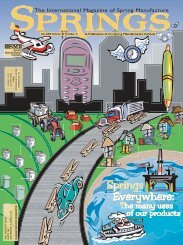Solid Height - Spring Manufacturers Institute
Solid Height - Spring Manufacturers Institute
Solid Height - Spring Manufacturers Institute
Create successful ePaper yourself
Turn your PDF publications into a flip-book with our unique Google optimized e-Paper software.
Titanium Suspension <strong>Spring</strong>s for<br />
Production Motorcycles<br />
The first production motorcycles equipped with<br />
titanium shock springs are now in dealer showrooms.<br />
The 2006 Yamaha YZ model motocross bikes<br />
are the first motorcycles anywhere to be produced<br />
with lightweight titanium springs as original equipment.<br />
Four of the five machines in the YZ line carry<br />
the new shock springs (rear suspension springs).<br />
Chuo <strong>Spring</strong> Co. Ltd. (CHKK), Aichi, Japan, manufactures<br />
the springs for Yamaha from Timetal LCB<br />
titanium, a patented alloy supplied by Timet Automotive<br />
in Morgantown, PA.<br />
Light weight is critical to motorcycle performance,<br />
especially for motocross bikes, which must<br />
accelerate and decelerate as rapidly as possible to be<br />
competitive. Motocross courses typically have many<br />
turns, hills and jumps, and put strong emphasis on<br />
the dynamic characteristics of a motorcycle. Agility<br />
and strength are valued at a premium, as are<br />
power and light weight. Titanium, with its exceptional<br />
strength and very low mass, offers motorcycle<br />
designers and engineers certain characteristics not<br />
found in other materials, and its use is growing<br />
strongly in motocross and other performance motorcycle<br />
applications.<br />
The five 2006 YZ model Yamaha motocross bikes<br />
range from 146 lb. to 220 lb., and compete in one<br />
amateur and two professional racing classes that<br />
are extremely competitive. Because all of the bikes<br />
from different manufacturers that compete in these<br />
Less costly alloy brings titanium’s benefits to<br />
motocross rear suspension springs<br />
By Kurt Faller<br />
Timet Automotive<br />
classes are very light weight and closely matched<br />
in performance, exceptional weight-management<br />
engineering can yield significant results. A small<br />
relocation of weight can improve handling; a small<br />
reduction in weight can yield a critical performance<br />
advantage.<br />
The Titanium Pacesetter<br />
Yamaha has been the pacesetter in taking<br />
advantage of the benefits of titanium in production<br />
motocross bike applications. To gain the performance<br />
benefits of lower reciprocating weight in its<br />
four-stroke engines, Yamaha in 2001 was the first<br />
to use titanium engine valves. The intake valves<br />
were made of the traditional Timet alloy, Timetal<br />
6–4 (Ti-6Al-4V); and the exhaust valves were produced<br />
from a patented Timet high-temperature<br />
alloy, Timetal 1100 titanium. Reduced valve weight<br />
means less reciprocating mass, faster revving and a<br />
higher redline, producing more power for improved<br />
performance.<br />
For the 2004 model year, Yamaha introduced the<br />
first titanium exhaust-system head pipe and heat<br />
shield on production motorcycles, reducing weight<br />
and lowering the center of gravity of the four-stroke<br />
engine models. At the same time, titanium foot pegs<br />
were installed to save a few ounces more.<br />
For model year 2006, the Yamaha YZ125 and<br />
YZ250 two-stroke models, and the YZ250F and<br />
YZ450F four-stroke models all carry titanium shock<br />
springs, marking the first time production motorcycles<br />
from any manufacturer have been fitted with<br />
titanium suspension springs as original equipment.<br />
Yamaha claims the new springs offer “outstanding<br />
strength and fatigue tolerance” and reduce unsprung<br />
weight for improved suspension performance. The<br />
Timetal LCB springs vary in size and specification<br />
from model to model, but they are typically 30 percent<br />
lighter than the steel springs on the comparable<br />
2005 model and weigh 1.1 lb. (500 g) less than their<br />
steel counterparts.<br />
A Lower Cost Titanium <strong>Spring</strong> Alloy<br />
Engineers have long understood that the<br />
strength, density and modulus of titanium, among<br />
SPRINGS July 2006 49





